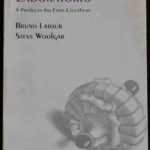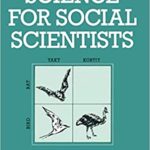![Vida de laboratório (Latour e Woolgar 1986 [1979]) Vida de laboratório (Latour e Woolgar 1986 [1979])](https://www.laspa.slg.br/wp-content/uploads/2021/04/lablife-663x1024.jpg)
Vida de laboratório (Latour e Woolgar 1986 [1979])
LATOUR, Bruno; WOOKGAR, Steve. 1986. Laboratory life: the construction of scientific facts. Princeton: Princeton University Press. [1979]
SALK ON LATOUR I:
He [Latour] has tried to observe scientists with the same cold and unblinking eye with which cells, or hormones, or chemical reactions are studied—a process which may evoke an uneasy feeling on the part of scientists who are unaccustomed to having themselves analyzed from such a vantage point. […] In reading this book about my colleagues who have been observed under a sociologist’s microscope, I realized how “scientific” a study of science could be when viewed by an outsider who felt impelled to imitate the scientific approach he observed. (Jonas Salk, in: Latour e Woolgar 1986:12)
SALK ON LATOUR II:
For myself, it was interesting to have Bruno Latour in our institute, which allowed him to carry out the first investigation of this kind of which I am aware and, most interestingly, to have observed the way in which he, and his approach, was transformed by the experience. It would be very useful for this critique itself to be criticized. This would both help the authors (and other scholars with similar interests and background) to assist scientists to understand themselves through the mirror provided, and help a wider public understand the scientific pursuit from a new and different and rather refreshing point of view. (Jonas Salk, in: Latour e Woolgar 1986:14)
QUESTÕES:
How are the facts constructed in a laboratory, and how can a sociologist account for this construction? What, if any, are the differences between the construction of facts and the construction of accounts? (Latour e Woolgar 1986:40)
THE CONSTRUCTION OF OBJECTS (facts):
Construction refers to the slow, practical craftwork by which inscriptions are superimposed and accounts backed up or dismissed. It thus underscores our contention that the difference between object and subject or the difference between facts and artefacts should not be the starting point of the study of scientific activity; rather, it is through practical operations that a statement can be transformed into an object or a fact into an artefact. (Latour e Woolgar 1986:236)
FATOS e ARTEFATOS:
The demystification of the difference between facts and artefacts was necessary for our discussion […] of the way in which the term fact can simultaneously mean what is fabricated and what is not fabricated. By observing artefact construction, we showed that reality was the consequence of the settlement of a dispute rather that its cause. Although obvious, this point has been overlooked by many analysts of science, who have taken the difference between fact and artefact as given and miss the process whereby laboratory scientists strive to make it a given. (Latour e Woolgar 1986:236; itálicos no original)
PERSUASÃO, CONSISTÊNCIA e o CAMPO AGONÍSTICO:
The solidity of the argument is always central to the dispute. But the constructed character of this solidity means that the agonistic necessarily plays a part in deciding which argument is the more persuasive. […] Once a statement stabilises in the agonistic field, it is reified and becomes part of the tacit skills or material equipment of another laboratory. (Latour e Woolgar 1986:238)
MAXWELL’S DEMONS:
A demon placed in a cold oven would be able to increase the amount of heat by allowing the swifter molecules to gather in one part of the oven and by keeping them there. In order to do this, the demon needs information about the state of the molecules, a small trap which will let them come or go depending on their quality, and an enclosure in which to prevent the sorted molecules from escaping and returning to their random state. We now know that the demon himself consumes a small amount of energy in doing his work. “It is impossible to get something for nothing, even information,” as the saying goes. (Singh, in: Latour e Woolgar 1986:244)
SCIENTISTS & CHAOS:
Between scientists and chaos, there is nothing but a wall of archives, labels, protocol books, figures, and papers. (Latour e Woolgar 1986:245)
O RASTRO:
Keeping track is the only way of seeing a pattern emerge out of disorder (Latour e Woolgar 1986:246)
WHY “ANTHROPOLOGY” OF SCIENCE (base empírica, foco nas práticas nativas, estranhamento metodológico e “reflexividade”):
In Laboratory Life, we indicated that our use of the term “anthropology of science” was intended to denote the presentation of preliminary empirical material, our desire to retrieve something of the craft character of science, the necessity to bracket our familiarity with the object of study, and our desire to incorporate a degree of “reflexivity” into our analysis. (Latour e Woolgar 1986:277-8)
COMO O FATO VEM A SÊ-LO:
Rather than produce an account which explained scientists’ activities in terms of the facts which they discovered, our interest was to determine how a fact came to acquire its character in the first place. (Latour e Woolgar 1986:278)
ETNOGRAFIA (menos pela tácita diferença do que pela incerteza metodológica):
Its main advantage is that unlike many kinds of sociology (especially marxist), the anthropologist does not know the nature of the society under study, nor where to draw the boundaries between the realms of technical, social, scientific, natural and so on. This additional freedom in defining the nature of the laboratory counts for much more than the artificial distance which one takes with the observed. This kind of anthropological approach can be used on any occasion when the composition of the society under study is uncertain. It is not necessary to travel to foreign countries to obtain this effect, even though this is the only way that many anthropologists have been able to achieve “distance.” Indeed, this approach may very well be compatible with a close collaboration with the scientists and engineers under study. We retain from “ethnography” the working principle of uncertainty rather than the notion of exoticism. (Latour e Woolgar 1986:279)
ÓCULOS:
those who read the book through realist spectacles will see error (Latour e Woolgar 1986:280)
SOCIOLOGIA PÓS-SOCIAL (ponto de vista sociológico universal):
There is no shame in admitting that the term [“social”] no longer has any meaning. “Social” retained meaning when used by Mertonians to define a realm of study which excluded consideration of “scientific” content. It also had meaning in the Edinburgh school’s attempts to explain the technical content of science (by contrast with internalist explanations of technical content). In all such uses, “social” was primarily a term of antagonism, one part of a binary opposition. But how useful is it once we accept that all interactions are social? What does the term “social” convey when it refers equally to a pen’s inscription on graph paper, to the construction of a text and to the gradual elaboration of an amino-acid chain? Not a lot. By demonstrating its pervasive applicability, the social study of science has rendered “social” devoid of any meaning (Latour e Woolgar 1986:281)
FALIBILIDADE:
we should accept the universal applicability of fallibility and find ways of coming to terms with it. Instead of utilizing it in a merely critical role, the aim would be to retain and constantly draw attention to the phenomenon in the course of description and analysis. We might as well admit that as a “problem” it is both insoluble and unavoidable, and that even efforts to examine how it is avoided are doomed in that they entail an attempt to avoid it. (Latour e Woolgar 1986:283)
REFLEXIVITY:
Reflexivity is thus a way of reminding the reader that all texts are stories. This applies as much to the facts of our scientists as to the fictions “through which” we display their work. The story like quality of texts denotes the essential uncertainty of their interpretation: the reader can never “know for sure.” We mentioned already the value of ethnography in stressing this uncertainty. Here we see that reflexivity is the ethnographer of the text. (Latour e Woolgar 1986:284)
MONADOLOGIA SOCIOLÓGICA:
Each text, laboratory, author and discipline strives to establish a world in which its own interpretation is made more likely by virtue of the increasing number of people from whom it extracts compliance. In other words, interpretations do not so much inform as perform. From this perspective, our scientists are obviously better equipped at performing the world we live in than we are at deconstructing it. The recognition of this vast difference is in no way self-defeating. It merely acknowledges the present balance of forces. How much further re-search, investment, redefinition of the field, and transformation of what counts as an acceptable argument are necessary to make this account more plausible than its alternatives? (Latour e Woolgar 1986:)




 O LaSPA é sediado no Instituto de Filosofia e Ciências Humanas (
O LaSPA é sediado no Instituto de Filosofia e Ciências Humanas (